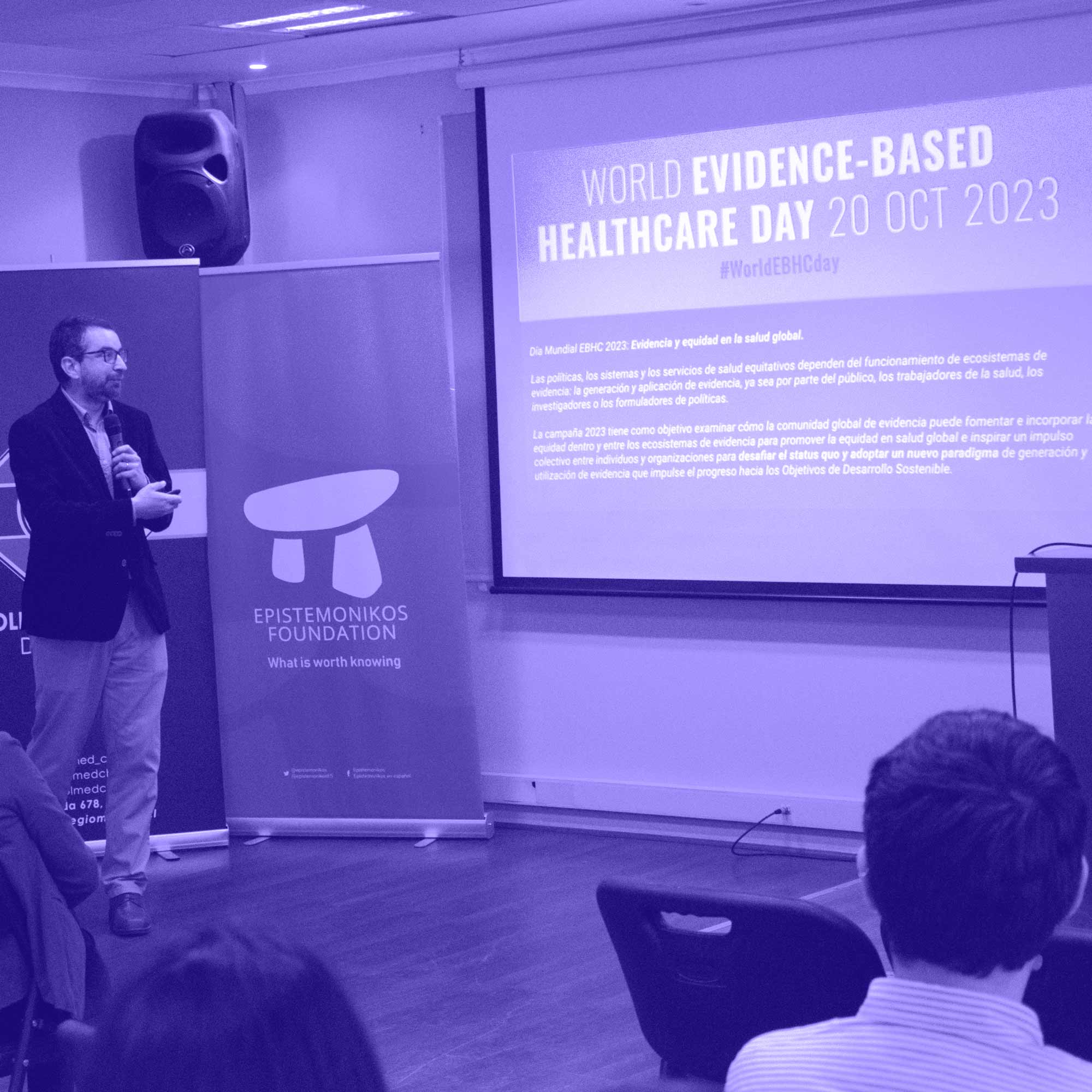
We celebrated World Evidence-Based Health Care Day 2023 with an event co-organized with the Chilean Medical Association.

03|NOVEMBER|2023
5 take-home messages from the event for evidence and equity
We celebrated World Evidence-Based Health Care Day 2023 with an event co-organized with the Chilean Medical Association.
On Thursday, October 19, 2023, we gathered to celebrate the World Evidence-Based Health Care Day 2023 with a public event co-hosted with the Chilean Medical Association.
For the second consecutive year, the Epistemonikos Foundation organized an event in Chile for the World Evidence-Based Health Care Day. This time, the event was held in collaboration with the Chilean Medical Association, within the framework of the collaboration agreement between both institutions. The event, titled Health Policies in Chile: Where is the Equity Perspective? was recorded and it is available on YouTube.
Our event was sponsored by the organization of the World Evidence-Based Health Care Day (worldebhcday.org) and was one of the 8 official events held around the world. Furthermore, the Epistemonikos Foundation was one of the 34 organizations recognized as Evidence Ambassadors for this year.
In line with the 2023 campaign for Evidence and Equity in Global Health, the event organized by the Epistemonikos Foundation and the Chilean Medical Association provided a valuable space for a conversation among experts in the field. They shared their perspectives on equity in two pivotal public policies for the country: the Explicit Health Guarantees Law and the Ricarte Soto Law.
Below, we've selected 5 key messages derived from the event:
-
Equity, equality, inclusion, and justice are not the same. Dr. Gabriel Rada kicked off the event with a conference in which he used a series of illustrations to explain the difference between the concepts of equity, equality, inclusion, and justice. These examples were reused several times in the subsequent panel discussion.
-
Social health inequity is a global, historical, persistent, colonial, systemic, and intergenerational phenomenon. At the beginning of the panel discussion, Dr. Báltica Cabieses characterized the issue of social health inequity in this way, gaining agreement from the other panelists.
-
The GES and Ricarte Soto laws were a significant step forward because they were the first effort to ensure health equity in Chile. All panelists recognized the work invested in these two unprecedented reforms, emphasizing that such public policies are not common in other countries. They also highlighted that these two laws work well for prioritized diseases and medications, advancing equity in access and healthcare financing. Dr. Paula Bedregal emphasized that, even though equity was a central framework of the GES Law, the focus settled on financial equity.
-
Significant improvements are needed in the GES and Ricarte Soto laws to make substantial progress toward a real equity perspective. The four panelists agreed that these two public policies currently contribute to ensuring health equity but have significant shortcomings that need to be addressed. Dr. Cristián Rebolledo stated that both laws have brought certain barriers to health equity to light and have also exacerbated other gaps. For instance, he mentioned the creation of an informal category of healthcare system users "non-GES" and "non-Ricarte Soto," generating a new inequality within the system. Additionally, Dr. Rebolledo proposed prioritizing within the groups prioritized by the GES Law, referring to differences in effective access to healthcare services. Dr. Bedregal added that an equity guarantee could be added to the existing guarantees of access, timeliness, financial protection, and quality.
-
The healthcare system in Chile is structurally inequitable, and there hasn't been a systematic and detailed measurement of inequalities, nor an assessment of the impact of public policy equity. In the context of the discussion about the improvements required in the GES and Ricarte Soto laws, Dr. Rebolledo pointed to the structural inequity of our healthcare system, within which these two public policies operate. Paula Nahuelhual concurred with this diagnosis, specifying that the system is centralized and has limited financing, resulting in public policies originating from it failing to provide universal coverage. Regarding the elements necessary for the local evidence community to effectively apply the PROGRESS-Plus framework, Dr. Cabieses stressed that researchers lack evidence to assess the impact of equity in health public policies in Chile. To this, Dr. Bedregal added that there is also no measurement of inequalities in the country. According to the panelists, these are some of the obstacles presented by our healthcare system for incorporating an equity perspective in line with the PROGRESS-Plus framework, either prospectively or retrospectively, for identifying inequalities, or measuring outcomes.
Have a look at some pictures from the event: